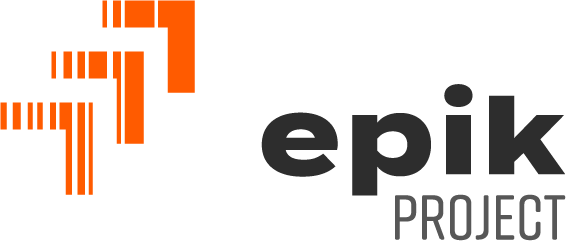Is Epik Project a Christian Organization?
“Is Epik Project a Christian organization?” I’ve been asked this question for years, and my answer is the same: "...it depends on what you mean.”
The question makes sense because I spent nearly three decades as a pastor before founding Epik Project. I hold a Master’s Degree in theology and have taught in classrooms and pulpits across the country and worldwide. I’ve performed at more weddings than I can count and funerals. I’ve provided pastoral counseling to divorcing couples and grieving parents in the ER. My former life as a professional religious person contains many of my most enduring friendships but also the worst experiences of betrayal and spiritual abuse.
Nevertheless, I still claim to be a follower of Jesus. However, that does not mean that Epik Project is a Christian organization in the way that term is typically understood. Let me explain.
While there are a myriad of organizations and initiatives that present themselves as “Christian,” there are two common denominators that typically support this particular label: 1) some measure of doctrinal conformity and 2) an emphasis on conversion. Whatever the nature of the particular work, publicly identified “Christian” organizations often promote a doctrinal stance that, whether explicit or implied, must be adhered to by anybody who wants to be a part of the work. Some organizations insist on members signing some kind of document as proof of agreement. Some organizations and most churches publish a “statement of faith” so those outside of the community know where those inside the community stand on a predetermined set of (presumably) important issues.
Organizationally, Epik Project doesn’t insist on any public indicator of doctrinal conformity. We have not, nor will we ever publish a statement of faith as a litmus test for participation in the work we do. That’s because what we do puts us close to people and organizations who make no spiritual claims whatsoever, but who are nevertheless doing important and necessary work in this space. We’ve worked hard for more than a decade to build trust and collaborative power with a broad community of partners, organizations, survivors, and most importantly, men.
Furthermore, because the men we are trying to reach are the ones buying sex, thinking of buying sex, or most importantly, men who are ignorant of the whole exploitative system, yet who could become powerful allies, labeling ourselves as “Christian” would be unnecessarily limiting. At Epik Project, we prioritize authentic connection over doctrinal agreement.
“Blessed are those who hunger and thirst for righteousness, For they shall be filled.”
We call this kind of connection “Generative Masculinity” and the term encapsulates a set of ideals that we believe, when embraced and practiced, especially by men, are full of the kind of potency necessary to reduce the proliferation of sex trafficking. Our focus therefore is cultivating communities of men who show up with true humility, who demonstrate tangible empathy, who choose to leverage their unique masculine strength for the benefit of others, and who know that changing the world for the better demands their best effort over a lifetime. If you need chapter-and-verse for these ideas, here you go: "Blessed are the poor in spirit, For theirs is the kingdom of heaven. 4 Blessed are those who mourn, For they shall be comforted. 5 Blessed are the meek, For they shall inherit the earth. 6 Blessed are those who hunger and thirst for righteousness, For they shall be filled.” Matthew 5:3-6
In our extensive experience, we have found that generative men have a unique capacity to authentically connect with and positively influence other men; especially active sex buyers.
Issac is one such generative man. He’s an Epik Project volunteer and the driving force behind our work in Southern California. An Army veteran and career railroad engineer, Issac tells a story of engaging with an active sex buyer during our online deterrence initiative one night. The buyer was combative at first, but rather than bludgeon the guy with shame-filled reprimands about all the harm he was doing, Issac asked the buyer, “Why, why are you doing this?”
Issac led with humility and empathy and the guy shared how, within less than a year he had lost his wife, his mother, and his brother. Eventually, the buyer shared how his grief had brought him to a crisis. He was willing to inflict permanent harm on a vulnerable woman so he could temporarily ease his own pain. Issac didn’t justify or excuse the buyer’s actions but instead focused on the reasons behind them. Before the call ended, both Issac and the buyer were in tears; one man in deep pain on the verge of doing something incredibly destructive; the other man showing up to offer grace and a way out. Scenes like this have been playing out in the work Epik Project has been doing for more than a decade. We don’t know what happens to guys like this after they hang up the phone, but what we do know is that we’ve been able to mobilize generative men (Issac isn’t the only one) to show up and authentically engage men swimming in a sea of destructive masculinity and offer them a lifeline.
The second common denominator among many Christian organizations is the priority given to conversion or proselytization. Whether implicit or explicit, the goal underlying all organizational activity is to somehow communicate a set of theological principles in an attempt to convert the person on the receiving end of the organization’s programs or initiatives. The motive for these approaches most often comes from a place of genuine conviction that the words being spoken are the solution to the problem being confronted. However, when agreement with a spiritual message becomes the condition for receiving support or participating in a program both the message and messenger are reduced to variables in a spiritual transaction. In 30 years of pastoral ministry, I never saw that strategy work and it doesn’t work in the fight against sex trafficking either.
At Epik Project, Christian identity is neither a qualification nor a disqualification for participation. We are not a church seeking conversions. We’re a growing community of men, Christian and non-Christian alike who are in this work because we recognize the power of speaking the truth in love to men bent on destroying lives through unrestrained sexual exploitation is the best way to reduce that damnable practice.
That’s not to say belief isn’t important. When it comes to dealing with men who buy sex (the source of all sex trafficking) belief is everything because the driving force for the demand that sustains the business of sex trafficking is a belief system among buyers that renting someone else’s body for a sex act is acceptable behavior. This belief system is strong, but we seek to embody a stronger set of beliefs about the way things ought to be. At Epik Project, we believe four things that ground everything we do:
We believe that women and men were made to flourish.
We believe that women and men share a fundamental right to equality
We believe that the systems, structures, and narratives that dominate our culture often favor men at the cost of women’s right to equality.
We believe that the way to change is for men to learn to stand alongside women as partners in building a world where everyone can flourish.
Each of these beliefs is rooted in Scripture and orthodox Christian tradition but has broad, culture-changing potential far outside the walls of any church. In light of that potential, I want to be clear in saying that while Epik is not focused on any measure of Christian conversion, any explicit preaching of what is most commonly considered the Gospel message, we are committed to embodying a core set of beliefs that are in perfect alignment with that message. We came to this position after years of sustained engagement with both the source of the problem (male sex buyers) and the object of their exploitation (survivors of sex trafficking). In ways unique to each group we have learned over and over the power of generative men to influence other men in positive, life-giving ways, chief of which is to deter them from buying sex and exploiting vulnerable people in the process.
Sex trafficking is a prolific and profound tragedy. It reveals some of the most egregious forms of violence imaginable. As an organization, we believe that the character of the messenger precedes the message itself. I find it fascinating (and personally challenging) the way Jesus seemed more inclined to quote scripture to religious people and faith communities who should have known better. To the irreligious, the ones often judged by said faith communities - Jesus showed up as a humble, empathetic man possessing an uncommon kind of strength and a relentless hunger to see the world become the way it ought to be. In other words, for those people, the messenger was the message, and the world was changed. All of this begs the question posed earlier. Is Epik a Christian organization or not? The answer is simple: yes.



